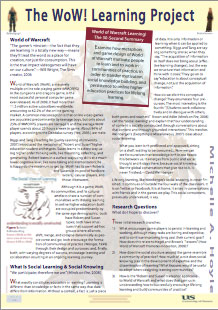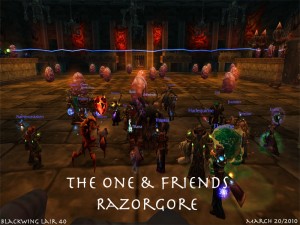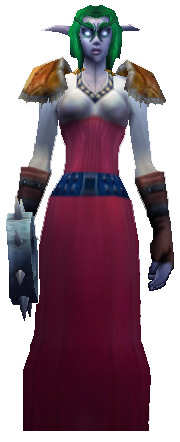For the last several months, I’ve been engaged in various activities all with the same intended goal: generate a concrete idea about what specifically I want to look at in Michelle 2.0, my new Ph.D. I’ve been mind mapping, writing permutation programs, brainstorming, discussing, writing essays, and writing thesis proposal plans. The most successful thing was probably having to sum up what I’m doing briefly for a visitor to the research lab’s weekly meeting this morning. While it answers the Twitter question “What are you doing?”, it’s too long to fit in 140 characters but it does fit into 40 words.
Q: What are you doing?
A: Looking at how metaphors and game design of World of Warcraft motivate people to learn and to work, with an eye to transferring motivation, social knowledge building, and persistence to online distance education practices, like teaching and community building.
There you go. Now we all know!
I’d just like to point out, though, that my ability to verbalize it so coherently and concisely is a result of all the other writing and thinking I’ve been doing. If I hadn’t written the essay in November and the extremely rough paper outline for a thesis proposal on Sunday, the idea would not have coalesced so concretely. Time, background cogitation and serendipity seem to be strong features of my new Ph.D. For me, not knowing exactly what I wanted to do, has been sharply focussed by talking, reading, writing, and going to seminars. It doesn’t matter what the seminars were or how relevant. It’s amazing how much I’ve drawn out of the motivational reading group I was participating in when I didn’t even know I was interested in motivation. Connections appear where you least expect them. The important thing is to take the leap and do.





 I have my annual Ph.D. review meeting tomorrow afternoon. As usual, I’m more than a bit nervous, especially as I made the big step this academic year of completely dropping my former Ph.D. work and starting a brand new topic that intersects the boundaries of my three main interests: communities, learning and teaching, and Internet-enabled technologies. As part of the review process, we’re asked to produce a 4-page report that explains what we’ve done since the last report. In your first year, this report ought to focus on your thesis proposal, although many students won’t yet have one. I do have some ideas about what I want to do and how I am going to go about it. I’ve made an online version so that it will be indexed and easily findable by others interested in World of Warcraft and e-learning.
I have my annual Ph.D. review meeting tomorrow afternoon. As usual, I’m more than a bit nervous, especially as I made the big step this academic year of completely dropping my former Ph.D. work and starting a brand new topic that intersects the boundaries of my three main interests: communities, learning and teaching, and Internet-enabled technologies. As part of the review process, we’re asked to produce a 4-page report that explains what we’ve done since the last report. In your first year, this report ought to focus on your thesis proposal, although many students won’t yet have one. I do have some ideas about what I want to do and how I am going to go about it. I’ve made an online version so that it will be indexed and easily findable by others interested in World of Warcraft and e-learning. 



